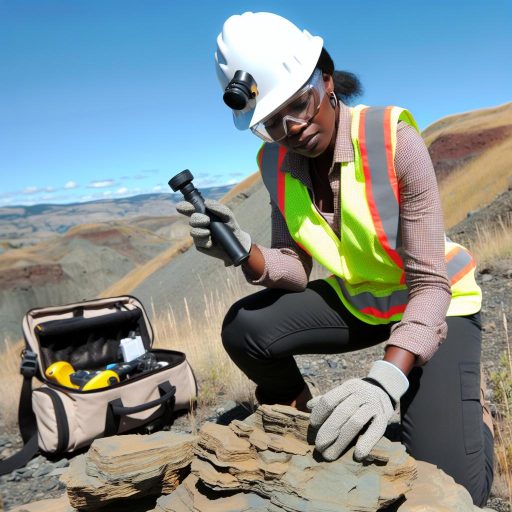Overview of the Field of Epidemiology in Canada
Importance of Epidemiology
Epidemiology plays a crucial role in public health in Canada.
Epidemiologists study the patterns and causes of diseases.
This discipline helps in formulating effective health policies.
Moreover, it guides the allocation of resources for health interventions.
Scope of Work
The scope of epidemiology in Canada is vast and varied.
Epidemiologists work in various settings, including government, academia, and healthcare.
They often collaborate with epidemiologists from other countries.
Additionally, they conduct studies on infectious diseases, chronic diseases, and environmental health.
Current Challenges
Epidemiologists in Canada face numerous challenges today.
For instance, they must address emerging infectious diseases.
Furthermore, they deal with health disparities among diverse populations.
Climate change also poses new public health threats.
Additionally, they need to improve data collection and analysis methods.
Educational Pathways
Becoming an epidemiologist requires specific educational qualifications.
Most epidemiologists hold at least a master’s degree in public health.
Specializations in epidemiology or biostatistics are common.
Additionally, many professionals pursue doctoral degrees for advanced research roles.
Hands-on experience through internships or practicum is highly beneficial.
Educational Pathways to Becoming an Epidemiologist
Undergraduate Education
A bachelor’s degree serves as the foundation for aspiring epidemiologists.
Students often choose degrees in public health, biology, or related fields.
This initial education introduces key concepts in health sciences.
Courses in statistics and research methods are particularly essential.
Graduate Education
Many epidemiologists pursue a master’s degree for advanced training.
A Master of Public Health (MPH) is a popular option among graduates.
This program focuses on epidemiology, biostatistics, and health policy.
Unlock Your Career Potential
Visualize a clear path to success with our tailored Career Consulting service. Personalized insights in just 1-3 days.
Get StartedCompleting an MPH often requires a capstone project or internship.
Alternatively, a Master of Science (MS) in Epidemiology further hones research skills.
Doctoral Education
Doctoral programs are ideal for those seeking leadership positions.
A Doctorate in Public Health (DrPH) or PhD in Epidemiology is common.
These programs emphasize advanced research techniques and methodologies.
Dissertation work typically addresses real-world public health issues.
Graduates often find roles in academic, government, or healthcare settings.
Relevant Certifications
Certification enhances career prospects in the field of epidemiology.
The Certification Board of Infection Control and Epidemiology offers credentials.
Additionally, the National Board of Public Health Examiners provides the CHES certification.
These certifications reflect a commitment to public health standards.
Skills Development
Developing key skills is crucial for success in epidemiology.
Strong analytical abilities enable professionals to interpret data effectively.
Communication skills facilitate collaboration with diverse teams.
Moreover, technical proficiency with statistical software is increasingly important.
Internships and Experience
Hands-on experience significantly enhances educational pathways.
Many programs encourage internships in public health organizations.
Such opportunities provide practical exposure to real-world challenges.
Networking during internships can lead to future job opportunities.
Volunteering in community health initiatives also builds relevant experience.
Bachelor’s Degree Requirements and Recommended Majors
A bachelor’s degree is essential for becoming an epidemiologist in Canada.
This degree serves as the foundational education for aspiring public health professionals.
Students can choose from various majors to pursue this path effectively.
Recommended Majors
Popular majors include public health, biology, and statistics.
A degree in public health directly addresses community health issues.
Biology provides a strong understanding of life sciences relevant to epidemiology.
Statistics develops critical analytical skills necessary for data interpretation.
Other suitable majors may include health sciences and social sciences.
Importance of Accreditation
Choosing an accredited program ensures quality education.
Accreditation enhances job prospects upon graduation.
Programs should ideally meet the standards set by public health organizations.
Gaining Practical Experience
Internships and hands-on experiences prepare students for real-world challenges.
Many academic institutions offer opportunities for field placements.
Engaging with local health departments can provide valuable insights.
Coursework Recommendations
Students should focus on courses covering epidemiological methods and biostatistics.
Understanding research design and public health policy is also vital.
Communication skills play an important role in this field.
Courses that enhance these skills will be highly beneficial.
You Might Also Like: How Physicists Contribute To Technological Innovation
Importance of a Master’s Degree in Public Health or Epidemiology
Foundation for Advanced Knowledge
A master’s degree equips epidemiologists with essential knowledge.
This education focuses on disease prevention and control.
Students study biostatistics, research methods, and health policy.
Such training prepares them to analyze data effectively.
Career Opportunities in the Field
A master’s degree opens doors to diverse career paths.
Epidemiologists can work in public health departments.
They may also find roles in healthcare agencies and research institutes.
Furthermore, they can engage in teaching at academic institutions.
Enhanced Professional Skills
The program enhances crucial skills necessary for the field.
Communication skills are vital for presenting findings clearly.
Leadership skills help in managing public health initiatives.
Problem-solving skills are indispensable in addressing health crises.
Networking Opportunities
Graduate programs foster collaboration among peers.
Students often engage in internships and fieldwork during study.
This exposure builds professional relationships in the industry.
Consequently, these networks provide support throughout their careers.
Contribution to Public Health
Master’s graduates significantly impact public health outcomes.
Their work influences policy and helps shape health interventions.
They contribute to research that improves community health measures.
Ultimately, their efforts advance public understanding of diseases.
Uncover the Details: Inspiring Stories of Geneticists Shaping Canadian Science
PhD Programs and Advanced Research Opportunities
Understanding PhD Programs
PhD programs in epidemiology offer in-depth knowledge and skills.
These programs typically involve coursework, research, and dissertation work.
Students develop expertise in bio-statistics, study design, and data analysis.
Many programs encourage interdisciplinary study with public health and medicine.
Additionally, students often engage in fieldwork to gain practical experience.
Key Canadian Institutions
Several reputable universities in Canada offer PhD programs in epidemiology.
The University of Toronto is known for its comprehensive curriculum.
McGill University emphasizes research and public health approaches.
University of Alberta provides a strong focus on community health initiatives.
Furthermore, the University of British Columbia offers diverse research opportunities.
Research Opportunities During PhD
PhD candidates typically engage in various research projects.
These projects often address current public health challenges.
Research can involve collaborations with healthcare organizations and government bodies.
Students gain valuable experience in grant writing and project management.
This hands-on experience prepares them for future careers in academia or industry.
Funding and Scholarships
Various funding options are available for PhD students in epidemiology.
Students may apply for scholarships from universities and government programs.
Additionally, many organizations offer research grants for specific projects.
Students should actively seek funding opportunities throughout their studies.
Such financial support can significantly ease the burden of tuition and living expenses.
Networking and Professional Development
Participating in conferences enhances professional development for epidemiology students.
Attending these events provides networking opportunities with professionals in the field.
Moreover, students often present their research findings at these conferences.
Engaging with peers fosters collaboration and knowledge exchange.
Building a professional network is crucial for career advancement in epidemiology.
Post-PhD Career Paths
After completing a PhD, graduates find diverse career opportunities.
Many pursue positions in academia as professors or researchers.
Others work in government roles, focusing on public health policy.
Many graduates also find roles in non-profit organizations or healthcare industries.
A PhD in epidemiology opens doors to meaningful contributions to society.
See Related Content: Skills You Need to Succeed as an Oceanographer

Certification and Licensing for Epidemiologists in Canada
Overview of Certification
Certification for epidemiologists in Canada is essential for professional recognition.
This process often involves obtaining credentials from recognized organizations.
For instance, the Canadian Public Health Association offers a certification program.
Such programs ensure that candidates meet the necessary educational and professional standards.
Furthermore, certification enhances career prospects and credibility in the field.
Professional Licensing
Licensing requirements vary by province and territory in Canada.
Some regions may require epidemiologists to hold a specific license to practice.
This ensures the public that they receive services from qualified professionals.
Individuals should check with local regulatory bodies for specific requirements.
Additionally, staying informed about changes in regulations is crucial for compliance.
Educational Requirements
A master’s degree in public health is often a prerequisite for certification.
Many candidates pursue specialized training in epidemiology or related fields.
Some positions may even require a doctoral degree for advancement.
Educational institutions provide various programs to meet these requirements.
Moreover, practical experience through internships or fieldwork is invaluable.
Continuing Education and Professional Development
Continuing education is vital for maintaining certification status.
Professionals must engage in lifelong learning to stay current in the field.
Workshops, seminars, and online courses offer valuable opportunities for growth.
Additionally, many employers encourage and support continuing education initiatives.
This investment in development enhances skills and overall career satisfaction.
Importance of Certification and Licensing
Certification and licensing are critical aspects of being an epidemiologist in Canada.
Professionals must meet specific educational and training requirements.
Staying up-to-date on regulations and continuing education fosters expertise.
Ultimately, these elements contribute to public health and safety across the country.
Gain More Insights: Exploring the Daily Work of a Geneticist in Canada
Continued Education and Professional Development
Importance of Continued Education
Continued education is essential for Canadian epidemiologists.
It helps them stay updated on recent research and advancements.
Moreover, ongoing learning enhances their skills and knowledge.
This commitment to education ultimately improves public health outcomes.
Opportunities for Professional Development
Various avenues exist for professional development in epidemiology.
Workshops and seminars provide hands-on learning experiences.
Online courses offer flexibility for busy professionals.
Attending conferences allows networking with peers and experts.
Additionally, internships can provide valuable practical experience.
Certification and Specialization
Certification enhances an epidemiologist’s credentials and opportunities.
Organizations like the Canadian Public Health Association offer certifications.
Specialization in areas like infectious diseases can be beneficial.
Focused training prepares epidemiologists for specific challenges.
Continuous certification renewal ensures professionals remain competent.
Staying Informed on Trends
Reading journals and publications is vital for staying informed.
Participation in professional associations provides updates on industry trends.
Social media platforms also offer real-time information sharing.
Networking with colleagues fosters knowledge exchange and collaboration.
Mentorship and Coaching
Seeking mentorship can significantly enhance an epidemiologist’s career.
Experienced professionals can provide guidance and support.
Coaching helps refine specific skills and focus on career goals.
Establishing a mentor-mentee relationship can lead to new opportunities.
Investing in a Lifelong Learning Culture
Organizations should promote a culture of lifelong learning.
Encouraging employees to pursue further education benefits everyone.
Funding for training programs can incentivize professional growth.
Creating a supportive environment fosters dedication to continuous improvement.
Key Skills and Competencies Required for Epidemiologists
Analytical Skills
Epidemiologists must possess strong analytical skills.
They need to interpret complex data effectively.
This ability helps in identifying patterns and trends.
Moreover, it assists in drawing meaningful conclusions.
Research Proficiency
Research proficiency is crucial for epidemiologists.
They should be adept at designing studies.
This includes formulating hypotheses and selecting appropriate methods.
Furthermore, they must be skilled in data collection techniques.
Statistical Knowledge
A solid understanding of statistics is essential.
Epidemiologists use statistical methods to analyze data.
This knowledge helps in interpreting results accurately.
Additionally, it enables them to evaluate risk factors.
Communication Skills
Effective communication is a key competency.
Epidemiologists must convey their findings clearly.
This includes writing reports and presenting data.
Furthermore, they should be able to communicate with diverse audiences.
Critical Thinking
Critical thinking skills are vital in epidemiology.
Professionals must evaluate sources and assess validity.
This competency is crucial for making informed decisions.
Moreover, it helps in addressing public health challenges.
Team Collaboration
Team collaboration is essential in this field.
Epidemiologists often work with diverse professionals.
This includes public health officials and researchers.
Effective collaboration enhances research outcomes and solutions.
Knowledge of Public Health Policies
Understanding public health policies is important.
Epidemiologists must be aware of health regulations.
This knowledge helps them advocate for necessary changes.
In addition, it strengthens their contributions to health initiatives.
Adaptability
Epidemiologists should be adaptable to change.
This field is dynamic, often influenced by emerging health issues.
Flexibility allows them to respond effectively to new challenges.
Moreover, it promotes ongoing professional development.
Additional Resources
What is your research question? An introduction to the PICOT format …




